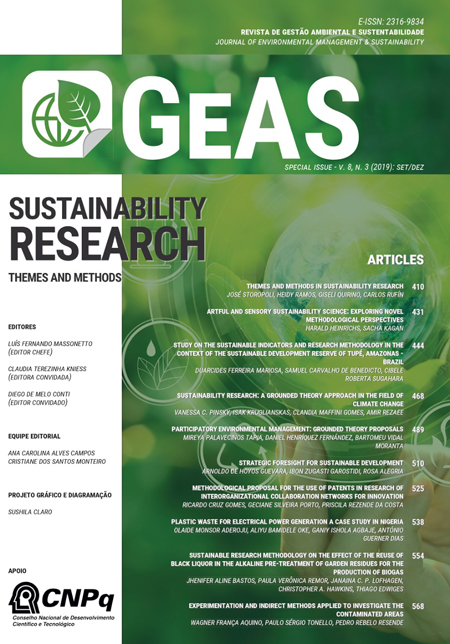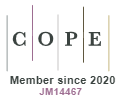SUSTAINABILITY RESEARCH: A GROUNDED THEORY APPROACH IN THE FIELD OF CLIMATE CHANGE
DOI:
https://doi.org/10.5585/geas.v8i3.15766Palavras-chave:
Construção de teoria, Teoria fundamentada, Pesquisa em desenvolvimento sustentável, Soft science, REDD , Mudança climática.Resumo
A mudança climática é um problema global, complexo e incerto, pois é impulsionado pelo comportamento humano, e apresenta riscos no longo prazo para os sistemas naturais e humanos. Mudanças no comportamento humano, fluxo de financiamento, instrumentos de política, e governança multinível são necessários para mitigar e gerenciar os principais riscos climáticos. Entender as dimensões sociais da mudança climática é, literalmente, um tema quente a ser estudado. A maior parte da literatura científica nessa área é focada em ‘hard science’. Diferentes métodos de construção de teoria são utilizados nas ciências sociais aplicadas. No entanto, o uso da abordagem da teoria fundamentada na pesquisa em sustentabilidade, especialmente ‘soft science’ na área de mudanças climáticas, é escasso. O objetivo desse artigo é discutir o uso do método teoria fundamentada em um campo de pesquisa emergente que combina governança e mudança climática. O artigo apresenta resultados substantivos de um quadro teórico emergente que explica o processo de governança de REDD+ no Brasil, um mecanismo de financiamento climático da Convenção-Quadro das Nações Unidas sobre Mudanças Climáticas (UNFCCC) focado na mitigação de emissões florestais em países em desenvolvimento. Ao invés de discutir sobre os melhores procedimentos e técnicas para construir uma teoria, que podem ser acessadas em várias publicações científicas, esse artigo apresenta um guia prático e discute as lições aprendidas para integrar o "Modelo Teórico de Governança em REDD+". Acadêmicos e pós-graduandos são encorajados a testar e validar (ou não) o modelo teórico emergente nesse estudo.
Downloads
Referências
Biernacki, P., & Waldorf, D. (1981). Snowball sampling: Problems and techniques of chain referral sampling. Sociological methods & research, 10(2), 141-163.
Charmaz, K. (1983). The grounded theory method: An explication and interpretation. Contemporary field research, 109-126.
Charmaz, K. (1996). The Search for Meanings - Grounded Theory. In J. A. Smith, R. Harre, & L. Van Langenhove (Eds.), Rethinking Methods in Psychology (pp. 27–49). London: SAGE Publications. https://doi.org/10.1016/B978-0-08-044894-7.01581-5
Corbera, E., & Schroeder, H. (2011). Governing and implementing REDD+. Environmental Science and Policy, 14(2), 89–99. doi:10.1016/j. envsci.2010.11.002
Corbin, J. M., & Strauss, A. (1990). Grounded theory research: Procedures, canons, and evaluative criteria. Qualitative sociology, 13(1), 3-21.
Corbin, J., & Strauss, A. (2015). Basics of qualitative research: Techniques and procedures for developing grounded theory (4th ed.). Thousand Oaks, CA: Sage Publications.
Fatorelli, L., Gebara, M. F., May, P., Zhang, S., & di Gregorio, M. (2015). The REDD+ governance landscape and the challenge of coordination in Brazil. Bangor. Retrieved from http://www.cifor.org/library/5508/the-redd-governance-landscape-and-the-challenge-of-coordination-in-brazil/
Friese, S. (2013). Data analysis and theory-building tools. In ATLAS.ti 7 User Guide and Reference (p. 469). Berlin: ATLAS.ti Scientific Software Development GmbH. Retrieved from http://atlasti.com/wp-content/uploads/2014/05/ATLAS.ti-7-Network-Views.pdf
Glaser, B. (1978). Theoretical sensitivity. Advances in the methodology of grounded theory.
Glaser, B. G., & Strauss, A. L. (1967) The discovery of grounded theory: strategies for qualitative research. Chicago: Aldine.
Goulding, C. (2002). Grounded Theory: A Practical Guide for Management, Business and Market Researchers (1st ed.). London: SAGE Publications.
Greene, J. C., Caracelli, V. J., & Graham, W. F. (1989). Toward a Conceptual Framework for Mixed-Method Evaluation Designs. Educational Evaluation and Policy Analysis, 11(3), 225–274. doi:10.3102/01623737011003255
Hall, W. A., & Callery, P. (2001). Enhancing the rigor of grounded theory: Incorporating reflexivity and relationality. Qualitative health research, 11(2), 257-272.
Hueser, N. G. (1999). Grounded Theory Research: Not for The Novice.
Ikeda, A. A., & Bianchi, E. maria P. G. (2009). Considerações Sobre Usos e Aplicações da Grounded Theory em Administração. Faces R. Adm, 8(2), 107–122.
INPE. (2019, May 28). PRODES – Monitoramento da Floresta Amazônica Brasileira por Satélite. Available at http://www.obt.inpe.br/OBT/assuntos/programas/amazonia/prodes. Last update 11/23/2018.
IPCC. (2014). Climate Change 2014 Synthesis Report - Summary for Policymakers. Retrieved from https://www.ipcc.ch/pdf/assessment-report/ar5/syr/AR5_SYR_FINAL_SPM.pdf
Jick, T. D. (1979). Mixing Qualitative and Quantitative Methods: Triangulation in Action. Administrative Science Quarterly, 24(4), 602–611.
Johnson, B., & Turner, L. A. (2003). Data collection strategies in mixed methods research. Handbook of mixed methods in social and behavioral research, 297-319.
Johnson, R. B., Onwuegbuzie, A. J., & Turner, L. A. (2007). Toward a Definition of Mixed Methods Research. Journal of Mixed Methods Research, 1(2), 112–133.
Kennel, C. F., Briggs, S., & Victor, D. G. (2016). Better indicators for risk management are needed after Paris. Science, 354(June 2008), 421–422.
Korhonen-Kurki, K., Brockhaus, M., Efrian, M., Juhola, S., Moira, M., Cynthia, M., & Bimo, D. (2017). Analyzing REDD+ as an experiment of transformative climate governance: Insights from Indonesia. Environmental Science and Policy, 73(December 2016), 61–70. doi:10. 1016/j.envsci.2017.03.014
Lederer, M. (2012). REDD+ governance. Wiley Interdisciplinary Reviews: Climate Change, 3(1), 107–113. doi:10.1002/wcc.155
Marcovitch, J., & Pinsky, V. C. (2014). Amazon fund: Financing deforestation avoidance. Revista de Administração, 49, 280–290. doi:10.5700/rausp1146
Masson-Delmotte, V., Zhai, P., Pörtner, H.-O., Roberts, D., Skea, J., Shukla, P. R., … Waterfield, T. (2018). Summary for Policymakers. Global Warming of 1.5°C. An IPCC Special Report on the impacts of global warming of 1.5 oC above pre-industrial levels. Global Warming of 1.5°C. An IPCC Special Report on the impacts of global warming of 1.5°C above pre-industrial levels and related global greenhouse gas emission pathways, in the context of strengthening the global response to the threat of climate change,. https://doi.org/10.1017/CBO9781107415324
Mathison, S. (1988). Why Triangulate? Educational Researcher, 17(2), 13–17. doi:10.3102/0013189X017002013
Miles, M. B., Huberman, A. M., & Saldaña, J. (2013). Qualitative data analysis: A methods sourcebook. 3rd ed. Thousand Oaks, CA: Sage.
Morse, J. M., Barrett, M., Mayan, M., Olson, K., & Spiers, J. (2002). Verification Strategies for Establishing Reliability and Validity in Qualitative Research. International Journal of Qualitative Methods, 1(2), 13–22. http://doi.org/10.1177/160940690200100202
Pinsky, V. C. (2017). Experimentalist Governance in Climate Finance: the case of REDD+ in Brazil. University of Sao Paulo. Retrieved from http://www.teses.usp.br/teses/disponiveis/12/12139/tde-14122017-163027/pt-br.php
Pinsky, V. C., Kruglianskas, I., & Victor, D. G. (2019). Experimentalist governance in climate finance: the case of REDD+ in Brazil. Climate Policy, 0(0), 1–14. https://doi.org/10.1080/14693062.2019.1571474
Pozzebon, M., Petrini, M., de Mello, R. B., & Garreau, L. (2011). Unpacking researchers’ creativity and imagination in grounded theorizing: An exemplar from IS research. Information and Organization, 21(4), 177–193. https://doi.org/10.1016/j.infoandorg.2011.09.001
Prins, G., & Rayner, S. (2007). The Wrong Trousers: Radically Rethinking Climate Policy. James Martin Institute for Science and Civilization, University of Oxford and the MacKinder Centre for the Study of Long-Wave Events, London School of Economics. Retrieved from http://eureka.bodleian.ox.ac.uk/66/1/TheWrongTrousers.pdf
Sabel, C. F., & Zeitlin, J. (2008). Learning from difference: The new architecture of experimentalist governance in the EU. European Law Journal, 14(3), 271–327. https://doi.org/10.1111/j.1468-0386.2008.00415.x
Sampieri, R. H., Collado, F. & Lucio, C. B. P. (2006). Metodologia de pesquisa. 3. ed. São Paulo: McGraw-Hill.
Stern. (2007). Stern Review on the Economics of Climate Change. Journal of Economic Literature, 7(4), 233–724. doi:10.1257/jel.45.3.703
Strauss, A. L. (1987). Qualitative analysis for social scientists. Cambridge university press.
Strauss, A., & Corbin, J. (1990). Basics of qualitative research: Grounded theory procedures and techniques. Newbury Park, CA: Sage.
Suddaby, R. (2006). From the Editors: What Grounded Theory Is Not. Academy of Management Journal, 49(4), 633–642. https://doi.org/Editorial
Sutton, R. I., & Staw, B. M. (1995). What Theory is Not. Administrative Science Quarterly, 40(3), 371–384. Retrieved from http://links.jstor.org/sici?sici=0001-8392%28199509%2940%3A3%3C371%3AWTIN%3E2.0.CO%3B2-F Administrative
Tashakkori, A., & Teddlie, C. (Eds.). (2003). Sage handbook of mixed methods in social & behavioral research. Sage Publications.
UN Environmental Programme. (2019). Global Environment Outlook – GEO-6: Summary for Policymakers. Cambridge. https://doi.org/10.1017/9781108639217
Van der Werf, G. R., Morton, D. C., DeFries, R. S., Olivier, J. G. J., Kasibhatla, P. S., Jackson, R. B., … Randerson, J. T. (2009). CO2 emissions from forest loss. Nature Geoscience, 2(11), 737–738. https://doi.org/10.1038/ngeo671
Wagner, G., & Zeckhauser, R. J. (2012). Climate policy: Hard problem, soft thinking. Climatic Change, 110(3–4), 507–521. https://doi.org/10.1007/s10584-011-0067-z
Yin, R. K. (2004). The case study anthology. Sage.
Downloads
Publicado
Como Citar
Edição
Seção
Licença
Copyright (c) 2019 Revista de Gestão Ambiental e Sustentabilidade

Este trabalho está licenciado sob uma licença Creative Commons Attribution-NonCommercial-ShareAlike 4.0 International License.










